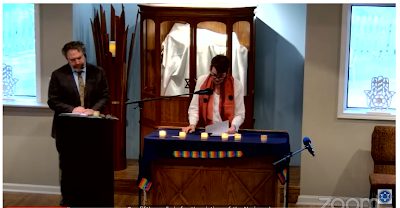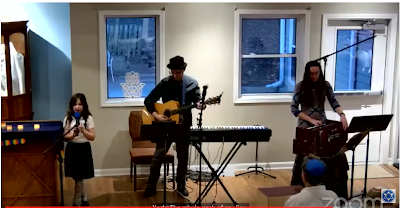Commemoration and Conversation
Sometimes what seems like an inconvenience turns into an opportunity. Last weekend, we discovered that my husband had a work obligation at the same time that I was scheduled to help lead and participate in the CBH Yom Hashoah service on Tuesday. I had arranged to loan the MHHE exhibit Words, Music, Memory to the synagogue and had helped to organize the service along with wonderful lay leaders Miriam Karp and Sandra Menes. Miriam had secured participation in a candle lighting ceremony to honor the victims of the Holocaust, and offerings of testimony from members of our community whose family members had survived. I had worked to make sure there would be music from our chorus and strings, including a new arrangement of Khayele's Waltz, a piece written by Laurence Sherr, whose compositions based on words by Nelly Sachs and Shmerke Kczerginski were featured in the exhibition.
 |
| Rabbi Mike Rothbaum introduces Amy Lighthill who lights a candle for the LGBTQ+ victims of the Holocaust at the start of the CBH Yom Hashoah Service on April 18, 2023. |
Normally, an event like this would be outside the parameters of bedtime on a school night, and a lot to ask of a six-year-old and a nine-year-old. But with Matt committed to observing a colleague in the classroom, and our babysitter unavailable, Ilana and Leo were with me.
As an experienced Holocaust educator, I'm used to a fifth-grade minimum for in-depth discussion of the Holocaust, but, of course, my kids have experienced early exposure in bits and pieces as my work has found its way into dinner conversation, and as I've reacted to news events from a perspective informed by many years of thinking about "difficult history."
But this felt different to me. This would be their first night of immersion in the collective remembrance and mourning practices of their own community. This experience would literally hit close to home.
I prepared for the coming together of my many identities and responsibilities as best I could. I bribed the kids with a dinner of ramen and boba tea and promised them the opportunity to watch a movie in the synagogue office during most of the service as long as they came back at the end to sing "Ani Ma'amin" with the chorus, beautifully framed as a song of hope and generational survival by our interim chorus director, Bonnie Levine. They were on board.
On Tuesday morning, I woke up haunted by the shooting of Ralph Yarl by Andrew Lester in Kansas City, Missouri. Ralph is only seven years older than Leo. He was out on an errand to pick up his twin brothers and went to the wrong house. He made a tiny mistake that almost cost him his life. My children make tiny mistakes all the time.
At dinner, I mentioned what was on my mind to the kids while we were waiting for our food. Leo's face constricted immediately, and I found myself rushing to reassure him that Ralph was alive. As if that could mitigate the horror of what happened. As if that negated the injustice of the danger that people with black bodies live with as they navigate their day-to-day existence in a country where racism lurks like poison in water after an oil spill. Danger remained with Leo as we entered the synagogue, and stayed with him even after I settled him into the office with a tablet loaded with cartoons.
About halfway through the program, Ilana came to sit with me. It was past her bedtime, but she pushed her body against mine and laid her head on my shoulder while we listened to testimony from our fellow congregants. People who greeted her weekly with smiles and affection talked about their parents and other loved ones whose neighbors and friends turned away from them. They talked about a world where affection and coexistence were replaced with hostility and murderous intolerance. Ilana quietly absorbed it all. (I only knew the extent of her retention the next morning when she recalled the emotional testimony almost word for word at the breakfast table.)
When it was time for our closing song, I sent Ilana to fetch Leo. He appeared looking pale. He shivered while he stood next to me and sang along as he had promised. He had been well only minutes before, but he was determined to show his respect and wait until after the service was over to talk with me about what was bothering him.
 |
| Eden Levine sings the opening verse of Rebekka Goldsmith's rendition of "Ani Ma'aim" with her parents, Michael and Bonnie, accompanying her. |
After the song, Rabbi Mike addressed the children directly. Perhaps he sensed their discomfort. He spoke about why our community was committed to remembering. Why we told these stories over and over again, even though they made us feel sad.
When the last notes from the strings playing "Eli, Eli" faded from the air, I gathered my children and prepared to leave quickly. As I was packing up the tablet, Leo told me that his mind had been on the possibility of guns and the people who were waiting to use them. He told me that a gathering of Jews observing Yom Hashoah would be a horribly, ironically logical target for a shooter who hated us for who we are. Only weeks before, the concept of a shooter had passed for Leo from the hypothetical to the real when he and his classmates were forced to cancel a carwash fundraiser for their class trip because someone was shot right across from their school. Shots were fired from a car, aimed at a pedestrian nearby, but students witnessed bullets grazing the vines in a ravine right next to the parking lot where the kids were washing cars. They had to run inside and hide until the danger had passed.
But when does the danger pass? Leo knew that there were people who hated Jews. He knew that Black people were in danger of being shot by police officers and neighbors. His view of the situation painted a world in which his Black friends and teachers might be shot by anyone at any time.
In the car ride home, I listened, and then I talked. I told my children about the history of policing in the United States, and especially in the South. I told them about slave patrols and about people who wanted to keep Black people from exercising their civil rights after Reconstruction. All of this was fresh in my mind having just attended the National Council on Public History conference in Atlanta the week before. I had listened with rapt attention as journalist Ann Hill Bond interviewed Donna Stephens and Genia Billingsley, co-chairs of the Chattahoochee Brick Company Descendants Coalition. I had been responsible for nominating them for a "Grassroots Public History Award."
Newly haunted by images of children's fingerprints in the paving bricks produced by John English's Chattahoochee Brick Company, I told my children about unjust laws added to the books during the time of Jim Crow. I told them about convict leasing. I told them about how people told each other stories about scary Black criminals in order to justify all the injustice. I told them about how white people who shot Black people were so often believed to have done so in self defense. I told them about how they themselves could come to believe that they had acted in self defense even if there was no sign of true danger. (I thought again about Andrew Lester and Ralph Yarl.) And how even police officers whose job it is to serve and protect their communities could react with deadly force against people they had been taught to fear and approach as inhuman "criminals" rather than people like them.
I spoke about how those stories were perpetuated and how they persisted. I told them, too, about the lies people tell about Jews. I told them, as best I could, about why people who didn't know any Jews could come to fear and hate them.
When I was done speaking, I listened again. Unbidden, Leo said, "Jewish people who are white can hide who they are from people who might hate them. Black people can't hide being Black."
I told him, "Yes. That's one reason why Jewish people experience hate differently, especially in this country. And that's why we have to work extra hard to stand up to hate wherever we see it. It's our job to help get rid of all the poison." I told him that people were doing that now in Kansas City. That the man who shot Ralph Yarl had been charged with a crime and was in custody. That people were not OK with a world where kids were at risk from their neighbors.
That night, as I was tucking him into bed, Leo thanked me for our talk. He told me that understanding all these things made them less scary. He could face all this stuff with interest instead of fear. I told him I was glad I could help.
What I didn't say was that as I've gotten older, sometimes all this understanding makes the world scarier to me instead of easier to navigate. I know what people are capable of.
And yet...
Ani ma'amin. I believe. This is why we remember, and why we teach our children. Even when it's scary. It's ironic how true it is that "all we have to fear is fear itself." (Thank you FDR...) And only we can work to release the antidote to this poison into the world.
In the words written in song by CBH chorus director Will Robertson, inspired by the perspective of our Rabbi Mike Rothbaum: "L'taken olam b'machut Shaddai. Aleinu."
"To heal the world through the power of spirit. It is on us."
You can view the Yom Hashoah service on YouTube here:
Comments